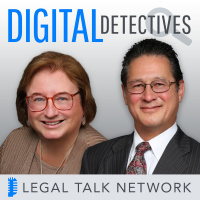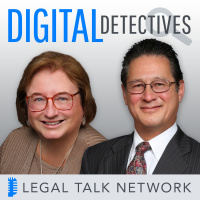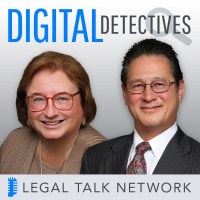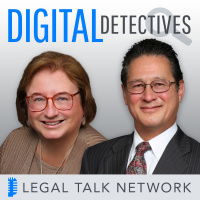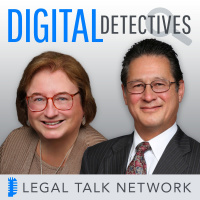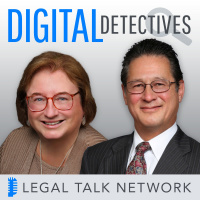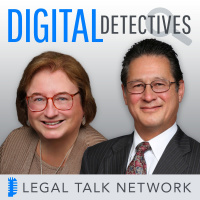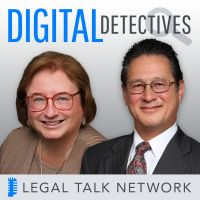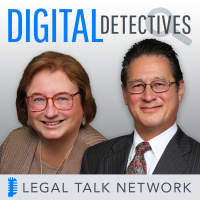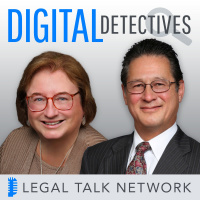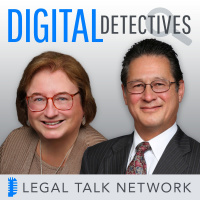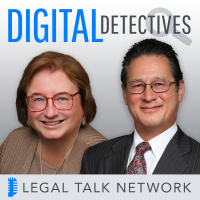Sinopsis
Hosted by two leaders in the cyber-security industry, Sharon D. Nelson, Esq. and John W. Simek, Digital Detectives is for listeners who are interested in digital forensics, e-discovery, and information security issues. Nelson and Simek invite digital forensic and computer security experts to enlighten listeners on the latest technology, cyber threats, and necessary security measures to keep online data secure.
Episodios
-
The Importance of Website Security for Law Firms
12/10/2016 Duración: 24minWhen thinking about a law firm’s marketing approach, many attorneys put heavy emphasis on having a well-constructed website to aid in attracting business, promoting convenient project management, and improving client retention. However, what potential security risks can your website pose to your firm and your clients? In this episode of Digital Detectives, hosts Sharon Nelson and John Simek sit down with SiteLock President Neill Feather to discuss the importance of website security, data breaches, and why hackers are attacking the websites of law firms. Special thanks to our sponsors, PInow and SiteLock.
-
Encryption, Cyber Security, and Domestic Surveillance
15/09/2016 Duración: 32minIn the wake of the Panama Papers breach, securing law firm and client data has been a huge concern for many practitioners in the legal space. Similarly, other information leaks like the Edward Snowden revelations have made the general public more aware of government surveillance than ever before. In this episode of Digital Detectives, hosts Sharon Nelson and John Simek sit down with executive director for the Electronic Frontier Foundation Cindy Cohn to discuss domestic surveillance concerns, encryption technology, and how lawyers and law firms can protect themselves and their clients from cyber attacks. Cindy Cohn is the executive director of the Electronic Frontier Foundation. From 2000-2015 she served as EFF’s Legal Director as well as its General Counsel. Ms. Cohn first became involved with EFF in 1993, when EFF asked her to serve as the outside lead attorney in Bernstein v. Dept. of Justice, the successful First Amendment challenge to the U.S. export restrictions on cryptography. Special thanks to our
-
Cyber Security for Small Firms and Solo Practices
18/08/2016 Duración: 20minIn this episode of Digital Detectives, hosts Sharon Nelson and John Simek speak with Oklahoma Bar Association’s Management Assistance Program Director Jim Calloway about ways small firm and solo attorneys can improve their cyber security. Jim talks about the increased awareness of cyber security in the solo and small law firm community as a result of the recent news coverage of data breaches occurring in a variety of companies. This level of visibility and growing pool of attorneys who have personal experience with someone who has had a data breach or digital disaster has cultivated an understanding that a compromised database or dead computer can put the entire law firm out of business. He states that seeing these large companies being compromised can often cause small firms with much smaller budgets to question if there is anything they can do to protect themselves. Jim points out that attorneys running their own firms or small businesses have a duty to supervise their employees and provides his 5 top cyber
-
The 2016 Georgetown Ediscovery Training Academy
21/07/2016 Duración: 29minIn this episode of the Digital Detectives, board certified trial lawyer Craig Ball talks with Sharon Nelson and John Simek about information technology competency and the 2016 Georgetown Ediscovery Training Academy. Craig explains that the bootcamp is six days of extensive work and requires a great deal of effort on the part of the attendees for weeks before they arrive. He asserts that the program’s hour long written assessment exam, three full days of technical training, rigorous reading requirements, and week-long “meet and confer” exercise are a few of the things that differentiate this curriculum from other continuing legal education courses. Craig also shares that the goal of the program is to establish a certain level of competency and fluency in e-discovery and digital evidence and to help cultivate a passion in individuals interested in these fields. He continues by stating that lawyers graduate lacking the basic skills that are necessary to teach themselves what they need to know about information t
-
Mandiant’s M-Trends and Verizon’s Data Breach Investigation Reports
29/06/2016 Duración: 23minIn the aftermath of the Panama Papers data breach many law firms have become hyper aware of their digital security risks. With the number of breaches on the rise what can lawyers do to keep informed of the most pertinent risks facing legal practitioners? In this episode of the Digital Detectives, hosts Sharon Nelson and John Simek speak with Clark Hill PLC Of Counsel David G. Ries about data security, Mandiant’s M-Trends, and Verizon’s Data Breach Investigation Reports. David opens the interview with an explanation of what these reports are (summaries developed by security service providers on data breach trends during the past year) and talks about how they help to organize collected information for ease of use. He then analyzes the subtle differences between the two reports, like the way they define terms like data breach and security incident, and gives some insight into the ways each company acquires their data. David also covers the top three key findings provided by each report and gives examples of ho
-
The Panama Papers: The World’s Largest Data Breach
23/05/2016 Duración: 29min2.6 terabytes of information spanning over forty years of a Panamanian law firm’s life was leaked to a German newspaper and subsequently, the world. What questions does this raise about a law firm’s responsibility for the loss of client/customer data? What lessons can we learn about security as a result of this firm’s data being compromised? In this episode of the Digital Detectives, hosts Sharon Nelson and John Simek chat with Nuix Chief Technology Officer Stephen Stewart about the Panama Papers, the world’s largest breach of information. Stephen explains that a law firm in Panama named Mossack Fonseca had 2.6 terabytes of information taken from them by an anonymous party, who then gave that information to the German newspaper Süddeutsche Zeitung (SZ). The leaked data contained 11.5 million items that consisted of roughly 5 million emails, 3 million databases, 2 million PDF files, and 1 million images. In an attempt to understand and further investigate the received data, SZ then contacted the International
-
Cyber Security Audits and Options for Your Law Firm
06/04/2016 Duración: 26minAs technology continues to become ever more integrated into our daily lives, the challenges that law firms face grow and evolve. Many tech savvy clients are not only concerned with a lawyer's ability to represent them but also their ability to protect their files and privileged communications. With more instances of data breaches and hacking being mentioned in the mainstream media, what can a law firm do to shore up their cyber security? In this episode of the Digital Detectives, hosts Sharon Nelson and John Simek sit down with LMG Security Founder and Senior Security Consultant Sherri Davidoff to discuss cyber security and the audits that are currently available for law firms. Sherri gets the conversation started by breaking down some of the more complex cyber security terminology into easy-to-understand language. The group then ponders factors, such as the loss of client data and law firms being hacked, that prompted this cultural shift within the profession and some of the elements that made it difficult
-
Edward Snowden's Legal Advisor Sides with Apple in FBI Battle Over Encryption
11/03/2016 Duración: 29minDuring the investigation of the San Bernardino shooting the FBI obtained a company iPhone that was used by Syed Farook, one of the assailants. The investigators obtained a warrant to search the phone, but it’s currently locked and the FBI hasn’t been able to access the encrypted data. This prompted the agency to request assistance from Apple to bypass the phone’s security features, but Apple has refused. Does the FBI have the authority to compel a company to re-engineer its own product in order to undermine the security of its own customers? In this episode of Digital Detectives, Sharon Nelson and John Simek interview the American Civil Liberties Union’s Speech Privacy and Technology Project Director and principal legal advisor to Edward Snowden Ben Wizner about the legal battle between Apple and the FBI. Wizner begins by explaining The All Writs Act and how it’s being used to coerce Apple, the FBI’s potential objectives in making this request, and what dangers might be present if the FBI prevails. The conve
-
What Law Firms Should Know About the FBI’s InfraGard Program
28/01/2016 Duración: 27minInfraGard, one of the longest running outreach associations, represents a partnership between the FBI and the private sector. Members include businesses professionals (including many law firm employees), people from academic institutions, and local participants who share their experience and expertise with the FBI to assist in crime prevention. In the recent climate of rampant cyber security issues, many in the private sector are better equipped to fight these cyber threats. So why is it important for lawyers to know about and potentially join InfraGard? In this episode of Digital Detectives, Sharon Nelson and John Simek interview FBI special agent and InfraGard coordinator Kara Sidener about the way InfraGard works and why lawyers and other law firm professionals should be interested in joining this two-way information sharing platform. Topics include: The evolution of cybercrime The Department of Homeland Security, the FBI, and the private sector Who joins InfraGard How and why members are vetted Be
-
Technology Assisted Review for Smart People
30/12/2015 Duración: 26minTechnology Assisted Review (TAR), also known as Computer Assisted Review, Predictive Coding, Computer Assisted Coding, and Predictive Ranking, has been around for 50 years, but is now becoming incredibly useful in the legal field. This technology can speed up cases of all kinds and greatly reduce discovery costs for their clients. But how do lawyers learn about TAR? After all, we’re not dummies. In this episode of Digital Detectives, Sharon Nelson and John Simek interview John Tredennick, the CEO of Catalyst Repository Systems, about his new book “TAR for Smart People,” what exactly TAR includes, and specific ways it has helped companies reduce discovery costs. Tredennick begins by explaining the three elements of TAR: teaching the computer algorithm, the algorithm orders review documents by estimated relevance, the lawyers decide what to do when the algorithm presents no more relevant documents. In other words, the computer algorithm continues to learn which documents are relevant to the case based on the c
-
Paris Attacks: The Digital Investigation, ISIS, and The Response
20/11/2015 Duración: 28minFollowing the terrorist attacks in Paris, French officials used metadata from a phone they found in a trashcan to gather information that made it possible to raid ISIS safe houses within a week. During these raids they were able to kill the suspected mastermind behind the operation, who was believed to be planning more attacks. Using a combination of cyber forensics and traditional police work, the French identified and successfully raided the purported hideout of the suspected ringleader. Considering our advanced technology, many are left questioning how this happened in the first place? And looking forward, can governments really prevent future acts of terrorism by building backdoors into encryption? In this episode of Digital Detectives, Sharon Nelson and John Simek discuss the digital forensics of the Paris attacks and the aftermath, including a surfacing argument about cryptic communication, the response from French, British, and American governments, and how Anonymous, the hacker group, has gotten invo
-
Catalyst’s Free E-Discovery Practicum for Law Schools
10/11/2015 Duración: 26minAlthough electronic discovery is increasingly important for court lawyers, only about 30 law schools nationwide offer e-discovery courses. To address the gap, Catalyst, an e-discovery service provider based out of Denver, has developed a practicum that aims to give law students the necessary experience to enter the workforce with adequate fundamental knowledge. So how does the program work and why is it important for future lawyers? In this episode of Digital Detectives, Sharon Nelson and John Simek interview Bill Hamilton, executive director of the UF E-Discovery Project at the University of Florida Levin College of Law, about their use of the Catalyst practicum. They discuss the curriculum’s components, the program’s pedagogical design, and what this means for the future of e-discovery education in law schools. Topics include: What a practicum is Digital evidence and students using e-discovery software Instructional videos, structured exercises, and quizzes with feedback Catalyst’s interest in educat
-
A New Dawn for the Association of E-Discovery Specialists
06/10/2015 Duración: 17minSharon Nelson and John Simek interview Mary Mack about the history of ACEDS, why certification is important for e-discovery professionals, and future trends in e-discovery, information governance, and overall technological competence for lawyers.
-
Hillary Clinton’s Emails and the Looming Issue of Shadow IT
03/09/2015 Duración: 28minSharon Nelson and John Simek interview Jason R. Baron, of counsel to Drinker Biddle & Reath, LLP and co-chair of The Information Governance Initiative, about the Hillary Clinton controversy and the future of Shadow IT, BYOD, and information governance.
-
Why are Law Firms Beginning to Form Data Breach Practice Groups?
26/08/2015 Duración: 28minRecently, data breaches have become one of the most serious threats to companies worldwide, and as more corporate infrastructure moves online, studies suggest that the rising number of data breaches will cost 2.1 trillion dollars globally by 2019. Because of this, a new market of data breach practice groups has emerged to assist with e-discovery, information governance, data security, and preparation for high-risk technological emergencies. In light of this, what should your law firm or company do to prepare for one of these potentially imminent situations? In this episode of Digital Detectives, Sharon Nelson and John Simek interview Martin Tully, co-chair of Akerman LLP’s Data Law Practice, about why his firm decided to implement a data breach law group, how data security fits in with current e-discovery and information governance practices, and what every company should include in an incident response plan.
-
E-Discovery Reflections from Retired Magistrate Judge John Facciola
23/07/2015 Duración: 26minOn this episode of Digital Detectives, Sharon Nelson and John Simek interview Judge Facciola about why lawyers need to learn about e-discovery now, how we can integrate e-discovery training into law schools and ongoing legal education, and the importance of law firms investing in professional development and creativity.
-
Lawmageddon and How to Prepare for Social Media in the Courtroom
08/06/2015 Duración: 31minIn this episode of Digital Detectives, Sharon Nelson and John Simek interview Nathaniel Russell about his definition of Lawmageddon, what the legal profession needs to embrace these changes, and the consequences lawyers face if they fail the tests of Lawmageddon. In the second half of the podcast, Russell discusses what can happen if lawyers ignore the presence of social media as evidence and the ethical responsibility all lawyers have to their clients with regard to social media and due diligence.
-
Judge Andrew Peck on TAR (Technology-Assisted Review)
08/05/2015 Duración: 26minIn this episode of Digital Detectives, Sharon Nelson and John Simek interview Judge Andrew Peck, an expert in issues relating to electronic discovery. Together they discuss the current state of technology-assisted review, how FRCP amendments will affect the way lawyers do discovery, and best practices when using TAR. Judge Peck explains the origin of using “technology-assisted review” as terminology over “predictive coding” or “computer-assisted review.” He explains that training the TAR program effectively is important, but the technology has progressed to a point where TAR will be successful as long as the training is sufficient and the scope of the team is in line. Finally, since the predictive coding programs are very expensive he explains when a case is big enough to warrant its use. Stick around to the end for a tip on using Federal Rule of Evidence 502 in court.
-
The Law of Robotics: Autonomy, Responsibility, and Risk
31/03/2015 Duración: 26minFrom self-driving cars and drones to robotic surgeons and soldiers, humans are delegating more tasks to machines and software. But who is responsible when then these new innovations cause damage, injury, or death? Can we trust machines to prioritize preserving human life when accidents inevitably occur? Should we be thinking about sweeping regulations? In this episode of Digital Detectives, hosts Sharon Nelson and John Simek interview The Law of Robots Professor Ed Walters. Together they discuss our robotic world and potential future risks. Can humans keep up, will our laws protect us, and how worried should we be? Tune in to hear insight on these questions plus many more.
-
Forensic Science in the Criminal Justice System: What is Admissible?
26/02/2015 Duración: 27minIn this episode of Digital Detectives, Sharon Nelson and John Simek interview Judge David Waxse about the 2009 report by the National Academy of Sciences (NAS), the relationship between bad science and wrongful convictions, and how to improve the use of forensic science in the criminal justice system. The NAS report, Strengthening Forensic Science in the United States: A Path Forward, found that with the exception of DNA, no forms of forensic science comply with scientific methodology. Waxse discusses the jury’s confidence in unproven science experts and witness testimony and the resulting wrongful convictions. He explains why people are just now becoming concerned with the 2009 report and discusses why The Willingham Case is relevant. Waxse plans to hold a symposium in April 2015 at Northwestern Law School in Chicago to consider with experts how to educate judges and lawyers in the criminal justice system about this issue.

